|
 Become
a fan on Facebook
Become
a fan on Facebook  Follow
on Twitter Follow
on Twitter
Article by Mark Dujsik | December 26,
2019
Here
are the ten best films of 2019:
 10.
Apollo 11 10.
Apollo 11
For
several summer days in 1969, all of humanity was united in the curiosity of
exploration, the celebration of technology, and the excitement of a singular
human achievement—the first manned moon landing. Fifty years later,
we've heard the story of editor/director Todd Douglas Miller's Apollo 11 told so many times, and we want to keep hearing it. We
know the story. We have a general idea of what kind of images we'll be seeing in
the film. The first shots, though, are revelatory. Much of this footage is new,
because it comes from archives that NASA hasn't released to the public until
now. Much of it was originally shot on 65 mm film, and Miller and his team have
restored it with such attention and care that it might as well have been shot
yesterday. Miller streamlines the mission to its core components, meaning the
film will serve as a more-than-fine introduction to the first moon landing for
generations of classrooms. For those who already have grown up with the
knowledge of this accomplishment, the documentary provides so much unseen,
faultless footage and presents it with so much assuredness that history almost
feels new again.
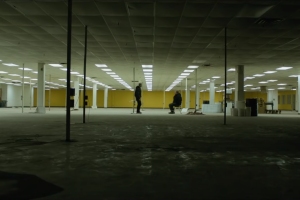 9.
The Standoff at Sparrow
Creek 9.
The Standoff at Sparrow
Creek
Writer/director
Henry Dunham's The Standoff at Sparrow Creek serves as a
humdinger of a mystery, a thriller of smoldering tension, and a morally
ambiguous examination of the mentality of a group of resentful, angry
outsiders. It's an assured first feature, set within an isolated locale
that seems claustrophobically enclosed at the start and slowly starts to feel
like a tomb (Jackson Hunt's cinematography, which uses the industrial setting to
backlight the characters and bathe them in oppressive shadows, is gorgeous in a
very unassuming way). Seven men, played almost exclusively by character actors,
enter an old lumber mill. There has been a shooting at a police funeral, and the
seven men, all part of a militia group in northern Michigan, would be considered
prime suspects by the police. James Badge Dale plays Gannon, a militia member
and former cop who becomes the group's go-to guy for determining who attacked
the funeral. The story and tension here are on conversations, debates, and
interrogations among its cast of characters—definitely not much sympathy for
these characters. Dunham neither condemns nor condones the group's motives or
goals. Instead, he lets us understand these men, as rational people pushed to
terrifying extremes.
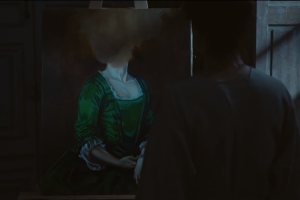 8.
Portrait of a Lady on Fire 8.
Portrait of a Lady on Fire
Writer/director
Céline Sciamma takes her time with Portrait
of a Lady on Fire, and the results are mysterious, romantic, and
quietly devastating. The key to the film's success is that it presents its
romantic leads—two thoughtful women, trapped within the conventions of their
time and class and social obligations—with such tenderness and understanding.
One is an artist named Marianne (Noémie Merlant), and the other is Héloïse (Adèle
Haenel), engaged to marry a wealthy Milanese gentleman. The plan,
arranged by the betrothed's aristocratic mother (played by Valeria Golino), is
for Marianne to paint Héloïse's portrait without the subject being aware of
it. These two women become quite intimate, by looks and by brief but pointed
conversations, before anything romantic emerges. That romance evolves naturally,
and in the process, Sciamma delves into deeper ideas, not only about the
relationship between art and the artist, but also about how such fleeting
moments can become eternal by their reflection in art. There's a sense of
mourning and the inevitable to Marianne and Héloïse's story, and the third act
of the film wrestles with time in deeply affecting ways. The
film observes and communicates these women and this relationship as they
are, as they were, and as they always will be.
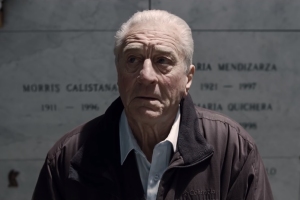 7.
The Irishman 7.
The Irishman
This isn't,
as far as we can tell, Martin Scorsese's swansong, but with The Irishman, he definitely and definitively seems to be closing the
book on his gangster films. The director's latest opus is a 209-minute
epic about a mob assassin making the long, eventful trek to becoming a
wheelchair-bound old man, alone and unloved and mostly forgotten in a nursing
home. Frank Sheeran (Robert De Niro, who, like a couple of his co-stars, plays
the character at various ages, thanks to some effective visual effects) is
a man digging his own grave, but so, too, is everyone else here. The other
players include Russell Bufalino (Joe Pesci, coming out of retirement for his
first significant screen role in 20 years), the cousin of a mob boss who helps
Frank get into crime, and Teamsters president Jimmy Hoffa (Al Pacino), who takes
Frank on as his right-hand man. Steven Zaillian's screenplay spins and
juxtaposes three narrative threads, showing Frank rising through the ranks, in
the hours before he will become infamous (if only in rumor), and telling his
life story to the only person who will listen—no one. After this archetypal
gangster faces the long and dark night of being alone and forgotten, what else,
really, could Scorsese have to say on the subject?
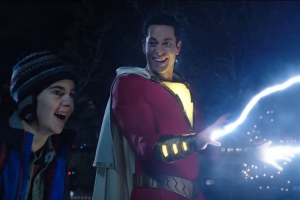 6.
Shazam! 6.
Shazam!
Here's
a film that isn't just a superiorly entertaining superhero tale. It's also a
very funny one, which skirts the line of parody without ever fully crossing it.
Shazam! shows just how easy it is to do something different with a
typical, worn-out story. Director David F. Sandberg and screenwriter Henry
Gayden also show how rewarding it can be to take such a chance. Billy
Baston (Asher Angel), a foster kid, receives superpowers from a wizard (Djimon
Hounsou), looking for a new champion to keep the forces of evil at bay. The kid
is granted the ability to transform into a muscle-bound,
skin-tight-costume-wearing adult superhero (played by an affably, awkwardly
foolish Zachary Levi), simply by shouting the hero's name: Shazam. The utter
absurdity of this setup shows that we're not expected to take the mechanics of
this superhero seriously, but there's also something pure about this premise.
Superheroes show us what we could be. The powers, such as flying and deflecting
bullets and shooting lightning, are just the benefits. The real aspiration is in
being the best person one can be. This is a great superhero film, because it
pokes at the silliness of these stories while still embracing the core of why
they matter. Whatever may come of this particular universe of superheroes, let's
hope that Shazam remains his own endearingly goofy and sincere entity.
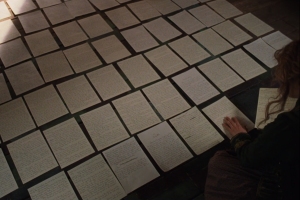 5.
Little Women 5.
Little Women
Greta
Gerwig doesn't just justify the existence of another cinematic adaptation of
Louisa May Alcott's beloved novel. The writer/director's Little
Women makes a strong case that we need a new
telling of Alcott's book every generation or so. The tale of the March
sisters, who grow up during the Civil War and find their places in the world in
its aftermath, is timeless for its simple storytelling and its rich characters.
The filmmaker has decided to play with the novel's structure, and the results
are enlightening, thoughtful, and quite daring. In this version, the
characters' pasts and the futures dance together through intercutting and
sometimes devastating juxtapositions. The overwhelming feeling is that we are
always in the present with these characters—their pasts leading inevitably
toward their futures, their futures defined by their pasts, their heartbreaks
and their joys and their deep bond as sisters an eternal constant. Gerwig's
simple re-shaping of the tale encourages us to consider, not only how Jo (Saoirse
Ronan), an aspiring writer, and her sisters (played by Emma Watson, Eliza
Scanlen, and Florence Pugh) grow over the course of almost a decade, but also
how vital Alcott's book is. Gerwig's version of Little
Women shows, without any doubt, that there is still much to mine and to
learn from Alcott's deceptively simple tale. This is a boisterously charming and
emotionally rich adaptation, giving new life to and new ways of looking at this
story.
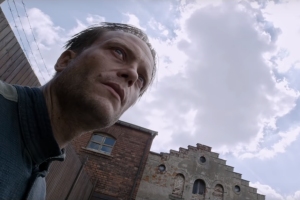 4.
A Hidden Life 4.
A Hidden Life
For
some time, Terrence Malick has been one of our most overtly religious
filmmakers. That trend seems to continue with A
Hidden Life, which tells the story of Franz Jägerstätter
(August Diehl), an Austrian farmer who became a conscientious objector when the
Nazis rose to power. In this telling, Franz stands up to an evil power
structure, is imprisoned away from his family, and must decide if his moral
belief is worth the cost of his life. Because Malick keeps the story grounded in
the mortal realm, Franz is wholly alone in his suffering, and the price of his
misery is the total of everything Franz is and could be. Malick is infinitely
patient in his approach to this tale. The story puts forth a simple but
impossible question: What can one person of sound conscience do in the face of
evil? Pain after pain is inflicted. Doubt after doubt comes. Opportunity after
opportunity is presented for Franz to save himself. Franz accepts the pain,
suffers the doubts, and refuses the opportunities. Malick's goal with A
Hidden Life is to present a man, ordinary in every way except in his
commitment to his faith. That faith is, simply and powerfully, in
the beliefs that there is right, there is wrong, and there is some
force—either from here or beyond—that tells us which is which. It's up to us
and us alone to decide what to do with that knowledge.
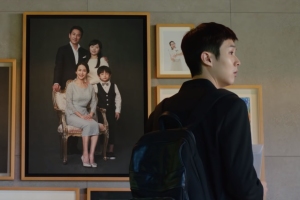 3.
Parasite 3.
Parasite
Parasite is a master class of tone control.
Co-writer/director Bong Joon Ho has crafted a film that's easy to describe but
difficult to categorize. It's a comedy and also a thriller, but the film
is much more than either of those simple characterizations. This is a
smorgasbord of a film, in terms of its methods, its goals, and its ideas. The
reason all of this works as well as it does—as a cohesive vision and an
exhilarating experience—is that Bong and co-writer Han Jin Won's screenplay
focuses on a single idea: desperation. Every character here is desperate in his
or her own way. Throughout
the film, Bong continually subverts our sympathies—making us question why we
connect to certain characters, reminding us why we did, and then starting the
process again.
The
basics of the plot have a poor family, the Kims, injecting themselves, one by
one, into the lives of a wealthy family, the Parks. From the story's start, the
film's title seems to suggest the Kim family, but there's also the thought that
the actual parasites are the Parks, using the Kims to live with even more
comfort. If both of these ideas can be true, maybe the real parasite is
something else. The majority of Parasite goes for laughs, horror, social satire, and
the excitement of not knowing what could come next, yet Bong and Han's
screenplay closes with a genuinely heartbreaking finale. That should seem
impossible, but such is Bong's mastery of this material.
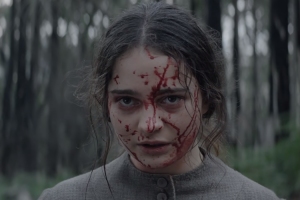 2.
The Nightingale 2.
The Nightingale
Writer/director
Jennifer Kent's film is about a lot of things—revenge, survival in the
wilderness, dehumanization through racism, the effects of colonization on a land
and a people, the cruelty of men and the apathy of the world.
The Nightingale takes a long
time—filled with misery upon misery, indeed, from start to finish—for Kent
to arrive at even a minimal glimmer of optimism. The story, set in Australia in
1825, follows Clare (an astonishing Aisling Franciosi), who is raped and whose
family is murdered by a trio of British soldiers, led by Leftenant Hawkins (Sam
Claflin, in an intimidating performance). She seeks revenge and enlists Billy (Baykali
Ganambarr), an aboriginal guide, to find the men who wronged her. The simple
plot, though, is merely the backbone of a much larger, much more nuanced
examination of various levels of cruelty and horror, as well as grief and
trauma.
Make
no mistake about it: This is a devastating film, which depicts horrible acts of
violence, perpetrated by pitiless men and our desperate, wounded protagonists.
Kent is unapologetic in her approach to these cruel acts, because they need to
be seen that way. Here, on full and dreadful display, is the merciless
behavior of men who only know how to communicate through violence. Such acts, as
Clare and Billy find her targets, are also those of our hopeless protagonists.
They have had everything taken from them and who, helpless, perceive that doing
the taking for once is the only response. By the end, this is simply but
profoundly the story of how violence, casually enacted for no reason or
seemingly justified for good reason, serves as its own fuel.
 1.
For Sama 1.
For Sama
This remarkable documentary from
co-directors Waad al-Kateab and Edward Watts puts
us right into the middle of life amidst a military conflict. For Sama shows the perspective of a young woman—a journalist, an
activist, a daughter, a wife, and, most importantly to the film's central
narrative, the mother of a daughter whose first year of life is entirely defined
by death, destruction, fear, and uncertainty. It's the best film of 2019.
Almost exclusively
shot by Kateab over a period of five years (from 2011 to 2016) in Aleppo,
Syria, the film is many things. It's a personal diary of what it is like to live
in the middle of an armed conflict. It's a war diary, in that Kateab is on one
side of the fight—against the regime of Bashar al-Assad and his Russian
allies—as a non-violent activist. It's a lament for this city and its
inhabitants. It's a testament to the courage, compassion, and selflessness of
those who remained behind.
This
film's existence is something of a miracle. It provides a straightforward
timeline of the fall of Aleppo, but the most extraordinary part of the
film—beyond its immediacy and its determination to show what happened as it
actually happened—is Kateab's own resolve to make herself part of the story.
It's an objective document of war, yes, but it is also, painfully a subjective
account of what it is like to be in war. As the violence escalates, she gives
birth to a daughter. The whole film is framed as a lengthy letter to Kateab's
daughter Sama, who does not even flinch at the sounds of explosions. It's almost
unimaginable, but this film shows us with heartbreaking, crushing clarity.
Honorable Mention:
American
Woman, Birds of Passage, By the Grace of God, David Crosby:
Remember My Name, The Day Shall Come,
Diane, Dragged Across
Concrete, 5B, Judy, Knives Out, The Load, Maiden,
Marriage Story, Mike Wallace Is Here, Pain and Glory, Queen
& Slim, Rocketman, Shadow, Transit, Uncut Gems
Copyright © 2019 by Mark Dujsik. All
rights reserved.
 Back
to Home Back
to Home
|
Buy Related Products

|
